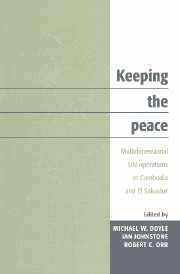Book contents
- Frontmatter
- Contents
- Preface
- Notes on the contributors
- List of abbreviations
- 1 Introduction
- Cambodia
- El Salvador
- Map
- 9 Insurrection and civil war in El Salvador
- 10 Peacemaking in El Salvador
- 11 The El Salvador Peace Accords: using international and domestic law norms to build peace
- 12 From peacekeeping to peacebuilding: restructuring military and police institutions in El Salvador
- 13 Rights and reconciliation in El Salvador
- 14 The arms-for-land deal in El Salvador
- Conclusion and chronologies
- Select bibliography
- Index
14 - The arms-for-land deal in El Salvador
Published online by Cambridge University Press: 22 October 2009
- Frontmatter
- Contents
- Preface
- Notes on the contributors
- List of abbreviations
- 1 Introduction
- Cambodia
- El Salvador
- Map
- 9 Insurrection and civil war in El Salvador
- 10 Peacemaking in El Salvador
- 11 The El Salvador Peace Accords: using international and domestic law norms to build peace
- 12 From peacekeeping to peacebuilding: restructuring military and police institutions in El Salvador
- 13 Rights and reconciliation in El Salvador
- 14 The arms-for-land deal in El Salvador
- Conclusion and chronologies
- Select bibliography
- Index
Summary
Introduction
Perhaps the most daunting challenge of post-conflict peacebuilding, and the one for which national governments and the international community still lack adequate mechanisms and proven strategies, is the reintegration of groups marginalized during years of conflict into productive, civil, and institutional life. These groups include not only former combatants and war-disabled, but often a large number of returning refugees and displaced persons.
El Salvador is rather a unique case in that the United Nations has been involved not only in peacemaking and peacekeeping but in post-conflict peacebuilding as well, where the parties to the peace agreements gave the UN a clear mandate of good offices and verification in the implementation of all peace-related programs. A series of UN-sponsored agreements culminating with the signature of the Chapultepec Peace Agreement in January 1992 (hereafter referred to as the Chapultepec Agreement) provided for reintegration to take place through three channels. These were participation in political life, admission to the National Civil Police and access to productive activities. As envisaged in the agreements, the agricultural sector would absorb not only the bulk of ex-combatants of both sides but also a large number of civilian supporters of the Frente Farabundo Martí para la Liberación Nacional (FMLN) – the so-called landholders (tenedores in Salvadoran parlance) – who had taken over and worked the land in conflict areas throughout the war years. Land was not to be “given away”; credit for purchase would be provided to potential beneficiaries.
- Type
- Chapter
- Information
- Keeping the PeaceMultidimensional UN Operations in Cambodia and El Salvador, pp. 342 - 366Publisher: Cambridge University PressPrint publication year: 1997
- 6
- Cited by



